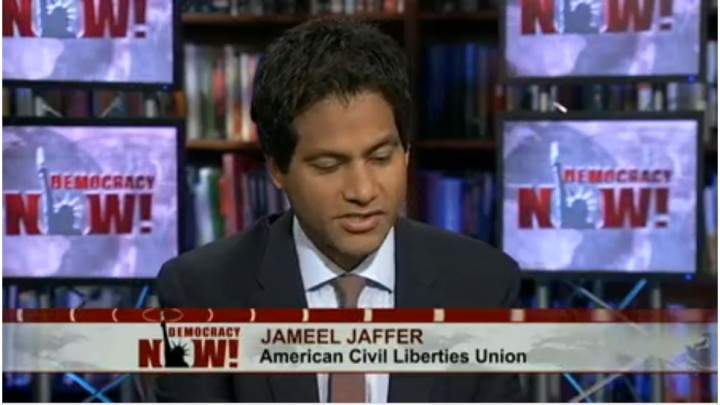A federal appeals court has ruled the National Security Agency’s bulk collection of millions of Americans’ phone records is illegal. The program was exposed by NSA whistleblower Edward Snowden; the ACLU filed its lawsuit based largely on Snowden’s revelations. In a unanimous decision Thursday, a three judge panel of the Second Circuit Court of Appeals in New York called the bulk phone records collection “unprecedented and unwarranted.” The ruling comes as Congress faces a June 1st deadline to renew the part of the Patriot Act that authorizes the NSA’s bulk data surveillance. Another measure, the USA Freedom Act, would lead to limited reforms of some of the NSA’s programs. We are joined by Jameel Jaffer, Deputy Legal Director of the ACLU, which filed the case challenging the NSA’s bulk collection of American’s phone records.
Transcript
This is a rush transcript. Copy may not be in its final form.
JUAN GONZÁLEZ: Welcome to all of our listeners and viewers around the country and the world. A federal appeals court has ruled the national security agency’s bulk collection of million of American’s phone records is illegal. The program was first exposed in 2013 by NSA whistleblower Edward Snowden. And the ACLU filed its lawsuit based largely on Snowden’s revelations. In a unanimous decision, Thursday, a three-judge panel, a second circuit court of appeals in New York, called the bulk phone records collection unprecedented and unwarranted. Judge Gerald Lynch wrote, “the government does not even suggest that all of the records sought or even necessarily any of them are relevant to any specific defined inquiry. In a concurring opinion, Judge Robert sack wrote, “considering the issue of advocacy in the context of deliberations involving alleged state secrets, and more broadly, the ‘leak’ by Edward Snowden that led to this litigation, calls to mind the disclosures by Daniel Ellsberg, that gave rise to the legendary ‘Pentagon Papers’ litigation.”
AMY GOODMAN: Thursday’s ruling comes as Congress faces a June 1 deadline to renew part of the patriot act that authorizes the NSA’s bulk data program. Another measure called the USA Freedom Act would lead to limited reforms of some NSA programs if passed. For more, we turn to Jameel Jaffer, Deputy Legal Director of the ACLU which filed the case challenging the NSA’s bulk collection of Americans’ phone records. His new article for Slate is called, “Flip the Patriot Act’s Kill Switch: Let the Worst Parts of the Law Die.” Well, Jameel, welcome back to Democracy Now! Talk about the significance of the court ruling.
JAMEEL JAFFER: Well, it is a very important ruling. It is something that we have been looking for now for almost two years since the first Snowden disclosures. This is a lawsuit relating to the call records program which is a program under which the NSA is collecting information about essentially every phone call made in the United States. Every time you pick up the phone the NSA has a record of who you called and how long you spoke to them and at what time you called. And that is an immense amount of information. They are collecting and not only about suspected terrorists and criminals, but about everybody, everybody in the country. So we challenged that program right after the first Snowden disclosures back in June of 2013, and it has been winding its way through the courts. And yesterday, we got this decision from a unanimous federal appeals court in New York and the opinion essentially says that the call records program isn’t authorized by the statute that the government is relying on. The Patriot Act is very broad, but even that has limits. The government has gone beyond the limits. So it’s a great ruling and it’s significant, not only because if the ruling stands, if it’s not overturned, it will end the call records program, but also because the same legal theory that the government is relying on to justify the call records program, it’s relying on to justify many other mass surveillance programs as well. So this ruling is going to require the government to reconsider some of those other programs as well.
Read the Full Transcript in Democracy Now!






